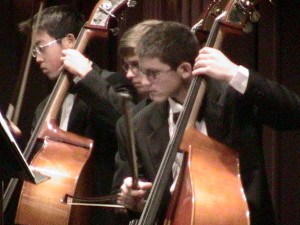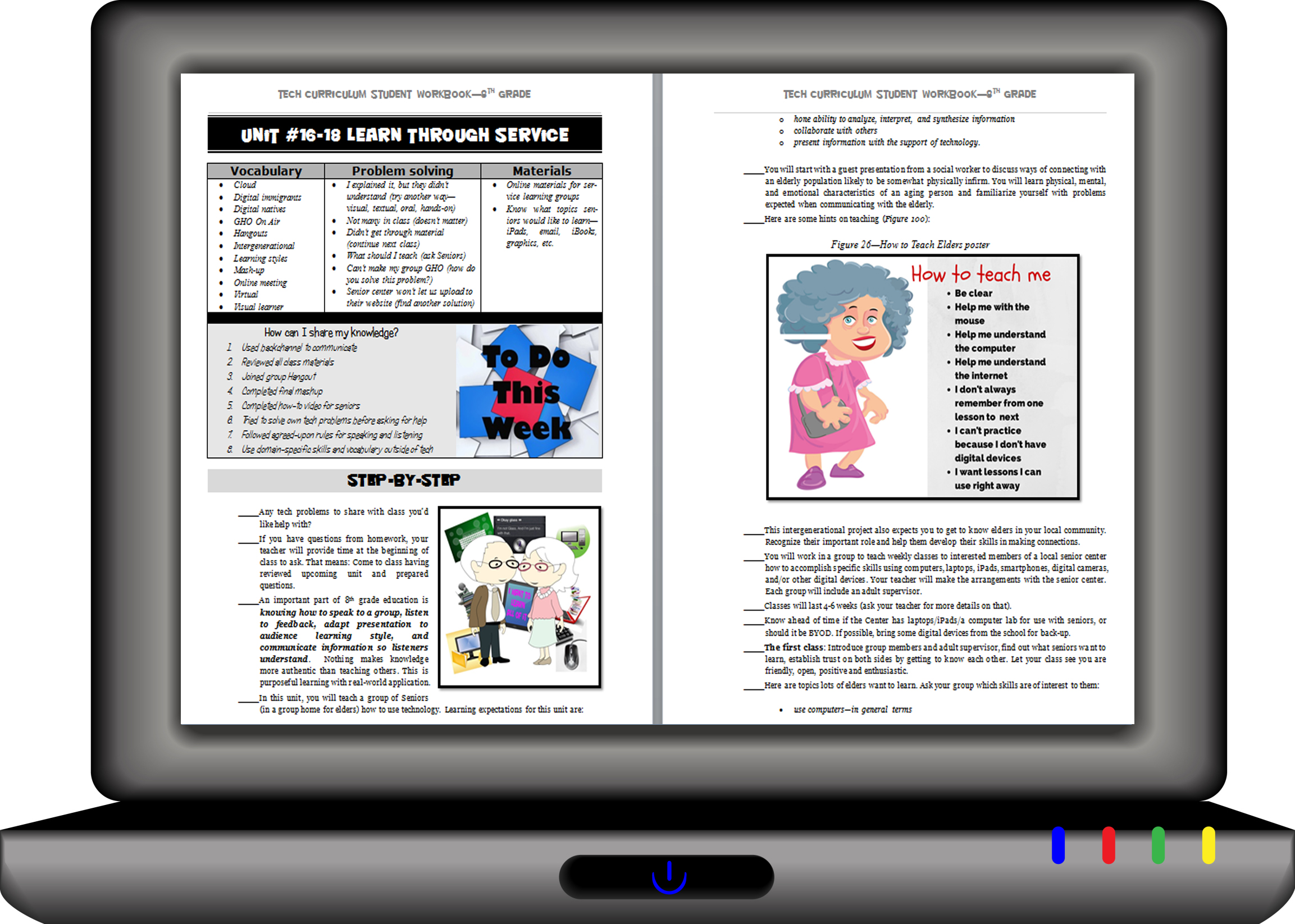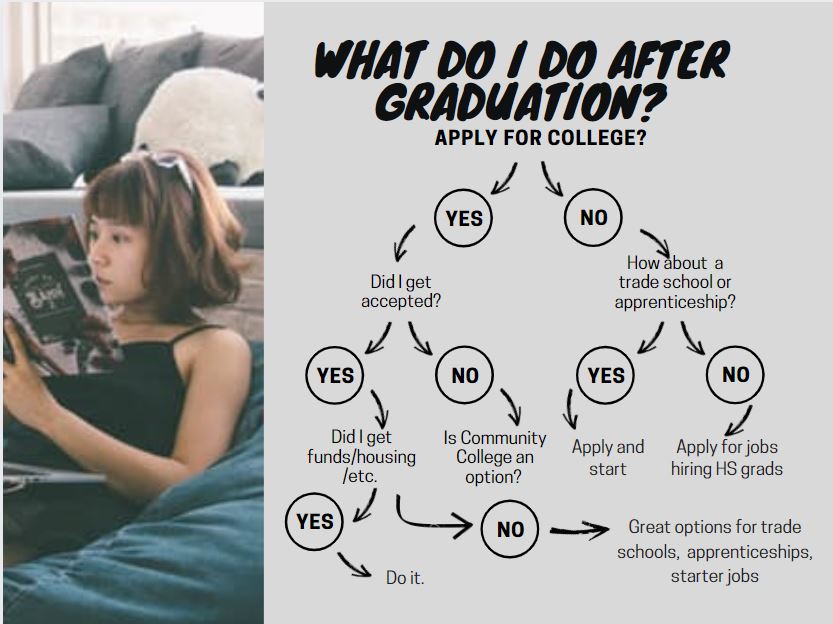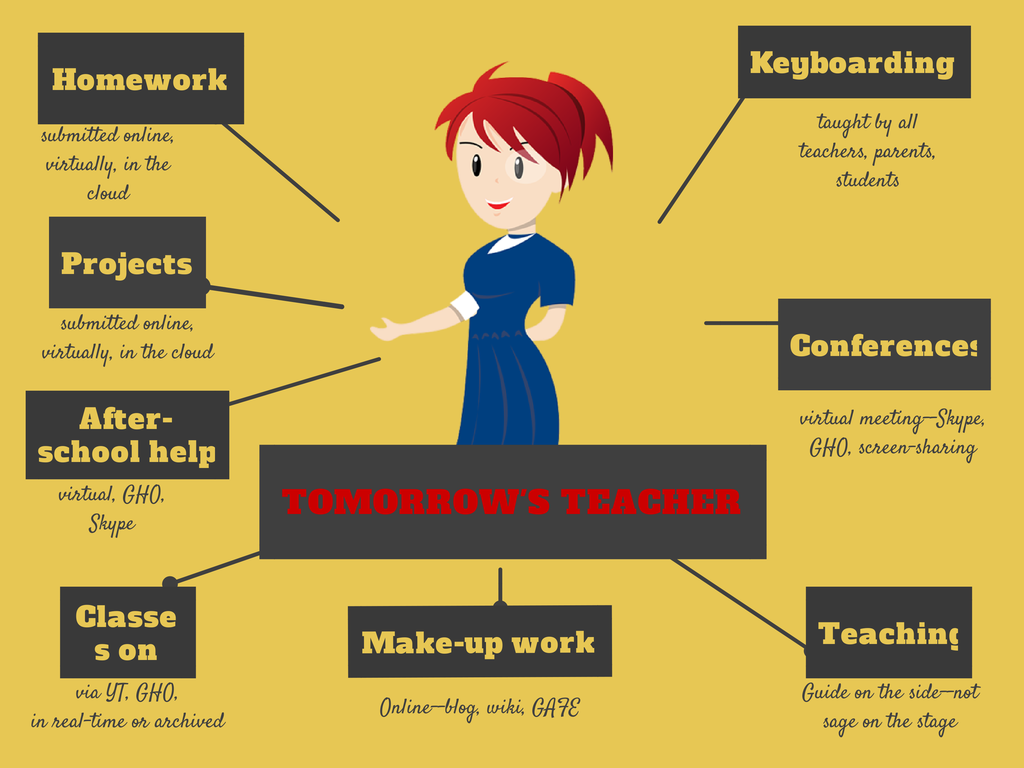Category: Guest post
5 Ways Teachers Can Stay on Top of Technology
Technology plays an important role in the classroom. Teachers can apply technology to help students learn through inter active games and simulations, or by taking advantage of educational resources online. Technology can facilitate communication and collaboration between students and between students and their teacher.
active games and simulations, or by taking advantage of educational resources online. Technology can facilitate communication and collaboration between students and between students and their teacher.
Students who develop a strong familiarity with technology in the classroom are better-equipped to remain proficient users of new technologies throughout their lives.
But in order to help students make the most of technology, teachers need to stay on top of it themselves. That can be challenging, especially for teachers who may have finished their own educations when the technological advances of the past 15 to 20 years were still in their infancy.
You can brush up on your tech skills by earning an advanced degree focused on helping you effectively integrate technology into your classroom, but you can’t just rest on your laurels. Changes are happening rapidly, and you need to keep abreast of them by staying informed, working with up-to-date devices and software as much as possible, and surrounding yourself with folks who are passionate about new technologies.
1. Keep Your Finger on the Pulse of Industry Trends
One of the best ways to keep your tech know-how up-to-date is to make it a point to stay current on industry trends. As the year draws to a close, search your favorite web browser for expected tech trends for the year to come. Throughout the year, you can keep tabs on which of these predictions came true by listening to tech podcasts during your commute or while doing chores at home.
2. Use Up-to-Date Devices at Home
You’ll feel more comfortable with new technologies if you use them regularly, so make a point of updating your own devices as often as you can. When you go to school online for an advance education degree, like a Master of Education in Instructional Design and Technology, you’ll learn how to make the most of tablets, computers, laptops, smart phones, and even newer technologies like smart watches or wearable fitness trackers. Visit big box stores regularly and browse through their electronics sections to see what’s new.
3. Surround Yourself with Technophiles
Share this:
- Click to share on Facebook (Opens in new window) Facebook
- Click to share on X (Opens in new window) X
- Click to share on LinkedIn (Opens in new window) LinkedIn
- Click to share on Pinterest (Opens in new window) Pinterest
- Click to share on Telegram (Opens in new window) Telegram
- Click to email a link to a friend (Opens in new window) Email
- More
Chromebooks in the Classrooms–Friend or Foe?
 AATT contributor, Krista Albrecht, has a balanced evaluation of Chromebooks in the classroom I think you’ll find useful. Krista is a NY State certified Instructional Technology Specialist working in public education on Long Island, NY. She has over 15 years experience in the field ranging from classroom teacher to tech teacher, to Professional Developer, to 1:1 integration specialist.
AATT contributor, Krista Albrecht, has a balanced evaluation of Chromebooks in the classroom I think you’ll find useful. Krista is a NY State certified Instructional Technology Specialist working in public education on Long Island, NY. She has over 15 years experience in the field ranging from classroom teacher to tech teacher, to Professional Developer, to 1:1 integration specialist.
Chromebooks in the Classrooms… Friend or Foe?
Chromebooks…those little computers that everyone is talking about. Everywhere you look in education people are talking about Chromebooks, Google Apps for Education, Chrome Apps, etc. So what’s the big deal with these things? Are they really useful in the classroom to help your students achieve greater understanding? In my opinion, yes, but like any other piece of technology they do have their own list of pros and cons. So here’s one Instructional Technology Specialist’s (this girl, right here) attempt at laying out what I see to be the pros and cons of Chromebooks in the classroom. Hopefully, after reading this article, you will have a better idea of how these devices fit in your educational setting.
What is this Chromebook you speak of?
Share this:
- Click to share on Facebook (Opens in new window) Facebook
- Click to share on X (Opens in new window) X
- Click to share on LinkedIn (Opens in new window) LinkedIn
- Click to share on Pinterest (Opens in new window) Pinterest
- Click to share on Telegram (Opens in new window) Telegram
- Click to email a link to a friend (Opens in new window) Email
- More
Three Life Skills High School Students Should Learn–and Why
 What is the goal of education? If you ask ten people, you’re likely to get fifteen different answers. AEP Distinguished Achievement Award Winner Dennis Littky and Samantha Grabelle discuss this in their well-regarded book, The Big Picture: Education Is Everyone’s Business. They draw from classroom experience and postulate that education is expected to teach students to:
What is the goal of education? If you ask ten people, you’re likely to get fifteen different answers. AEP Distinguished Achievement Award Winner Dennis Littky and Samantha Grabelle discuss this in their well-regarded book, The Big Picture: Education Is Everyone’s Business. They draw from classroom experience and postulate that education is expected to teach students to:
- be lifelong learners
- be passionate
- be ready to take risks
- be able to problem-solve and think critically
- be able to look at things differently
- be able to work independently and with others
- be creative
- care and want to give back to their community
- persevere
- have integrity and self-respect
- have moral courage
- be able to use the world around them well
- speak well, write well, read well, and work well with numbers
- truly enjoy their life and their work
Common Core succinctly summarizes K-12 education as
“…prepare students for college and career”
Ask a Tech Teacher contributor Sara Stringer focuses in on high school and shares her thoughts on three skills important to their future:
Share this:
- Click to share on Facebook (Opens in new window) Facebook
- Click to share on X (Opens in new window) X
- Click to share on LinkedIn (Opens in new window) LinkedIn
- Click to share on Pinterest (Opens in new window) Pinterest
- Click to share on Telegram (Opens in new window) Telegram
- Click to email a link to a friend (Opens in new window) Email
- More
Challenges to Implementing Computer Technology in Education
 What no teacher ever says: “I had no problem using technology in my classroom.” Even if YOU understand the plethora of digital tools, that often isn’t true for parents, other teachers, your Admin. Which becomes a challenge.
What no teacher ever says: “I had no problem using technology in my classroom.” Even if YOU understand the plethora of digital tools, that often isn’t true for parents, other teachers, your Admin. Which becomes a challenge.
Ask a Tech Teacher contributor Sara Stringer addresses some of the biggest problems even geeky teachers face when trying to build a technology-infused classroom:
Computers are more a part of education than ever before, be it classroom teachers using computer technology to get through to their students, or students attending classes entirely online. Computer technology has become the future of education, and yet there are still challenges that make technology less effective than it could be.
Technological Threats
With increased computer use also comes increased threats. Students and teachers who use public networks to access school resources are at greater risk from several different computer threats. While schools can make sure their internet security is up to date, individuals who connect with their personal devices can still end up loading infected files to the network.
One solution is to require that all outside machines meet certain specifications, such as having an up to date virus or internet security program installed. Even Macs are becoming more vulnerable to viruses and malware, and those users should install internet security or an antivirus for Mac that will send warnings if the machines are compromised.
Share this:
- Click to share on Facebook (Opens in new window) Facebook
- Click to share on X (Opens in new window) X
- Click to share on LinkedIn (Opens in new window) LinkedIn
- Click to share on Pinterest (Opens in new window) Pinterest
- Click to share on Telegram (Opens in new window) Telegram
- Click to email a link to a friend (Opens in new window) Email
- More
“Our children love being tested”–Here’s Why
There have been a number of stories about the failure of tablet technology in schools. 3rd grade teacher Michele Rice at Prairie Elementary School in Haysville, Kansas has found a way to markedly improve student achievement in lessons using tablet technology. She offers a step by step approach to ensuring an efficient and effective implementation of the technology.
How’s that relate to testing? Read on…
 If you told a child they were about to be given a ‘test’ to try to raise achievement, you could normally expect their enthusiasm to be almost non-existent. However, 3rd grade teacher Michele Rice at Prairie Elementary School in Haysville, Kansas has found a way to markedly improve student achievement in lessons which leaves children enjoying what they are learning, often without knowing they are taking a test at all.
If you told a child they were about to be given a ‘test’ to try to raise achievement, you could normally expect their enthusiasm to be almost non-existent. However, 3rd grade teacher Michele Rice at Prairie Elementary School in Haysville, Kansas has found a way to markedly improve student achievement in lessons which leaves children enjoying what they are learning, often without knowing they are taking a test at all.
Michele explains how she has used tablet technology to achieve such notable improvements.
“At Prairie Elementary School, we set high standards, based on our mission to equip learners with 21st century skills to achieve excellence in a continually-changing world. In these times of change, students need to learn in a way that will stimulate them and prepare them for the world they are going to live and work in.
“While it can seem incredible that a piece of hardware can really impact learning, the results are astonishing. When any learning activity is delivered on our tablets, attention, drive and results all improve. When I deliver a test from time to time to assess each student’s comprehension and level of development, they see it as another fun task!
Share this:
- Click to share on Facebook (Opens in new window) Facebook
- Click to share on X (Opens in new window) X
- Click to share on LinkedIn (Opens in new window) LinkedIn
- Click to share on Pinterest (Opens in new window) Pinterest
- Click to share on Telegram (Opens in new window) Telegram
- Click to email a link to a friend (Opens in new window) Email
- More
What do you do when Little Johnny wants career, not college?
 Common Core promises college and career, either/or, but what if you as a parent have been thinking ‘college’ so long, that you’re unprepared when your darling selects ‘career’? Ask a Tech Teacher contributor, Sara Stringer, has some ideas for you. I think you’ll like this:
Common Core promises college and career, either/or, but what if you as a parent have been thinking ‘college’ so long, that you’re unprepared when your darling selects ‘career’? Ask a Tech Teacher contributor, Sara Stringer, has some ideas for you. I think you’ll like this:
Every year, our school holds a Career Day, when people in our small-town community come and talk to our students about their careers. The trouble is, every year the careers represented are the same four or five careers that show up, like in a Richard Scarry book: teacher, banker, supermarket cashier. It’s no wonder that our kids grow up wanting to be movie stars and professional athletes, if these are the only other potential careers they see in person.
How can you teach your students about becoming a web developer if they’ve never met one? How can you teach your students about STEM careers in petroleum engineering — recently ranked on NPR as the college major that leads to the highest income — when there are no petroleum engineers within a 300-mile radius and, to be honest, you’re not quite sure what a petroleum engineer does?
Well, you’re a teacher. You have to think creatively.
Start by identifying interests, not careers
Share this:
- Click to share on Facebook (Opens in new window) Facebook
- Click to share on X (Opens in new window) X
- Click to share on LinkedIn (Opens in new window) LinkedIn
- Click to share on Pinterest (Opens in new window) Pinterest
- Click to share on Telegram (Opens in new window) Telegram
- Click to email a link to a friend (Opens in new window) Email
- More
4 myths to bust about game-based learning
 This is a hot topic with many of my teacher friends. Recently, I spent a wonderful hour chatting with efriend, Lindsey Hill (see her bio at the end) and found she had interesting ideas on game-based learning. I’ve been a fan of games in education since discovering Mission US (where students become actors in the American Revolution) and being schooled by students on the value of Minecraft. Lindsey shares my enthusiasm and took it a step further–facing head on the issues that are stopping teachers from using games in education. I think you’ll find her ideas fascinating:
This is a hot topic with many of my teacher friends. Recently, I spent a wonderful hour chatting with efriend, Lindsey Hill (see her bio at the end) and found she had interesting ideas on game-based learning. I’ve been a fan of games in education since discovering Mission US (where students become actors in the American Revolution) and being schooled by students on the value of Minecraft. Lindsey shares my enthusiasm and took it a step further–facing head on the issues that are stopping teachers from using games in education. I think you’ll find her ideas fascinating:
Teachers have many hurdles to jump to begin using digital learning in their classrooms. One thing, among many, that we know about teachers is they don’t give up easily. As a veteran teacher of 14 years and current lead for reading engagement initiatives at Evanced Solutions, I’ve had numerous discussions with educators on best practices for today’s tech-savvy kids. They want to try game-based learning, but it has been stigmatized as “mindless” fun. Critics of game-based learning are unaware that the touchscreen taps, mouse clicks and joystick jiggles can help sharpen cognitive skills.
Integrating the right kinds of games in the classroom helps kids have fun while simultaneously engaging in the process. Yet, teachers are often criticized for pushing more screen time on today’s techno-obsessed children. That’s why I suggest this simple “A.P.E.” principle to help combat four common myths about the use of e-games in the classroom.
A: Authentic Integration
P: Purpose-Driven Usability
E: Engagement
Myth #1: Game-based learning does not meet Common Core State Standards and is difficult to assess.
Share this:
- Click to share on Facebook (Opens in new window) Facebook
- Click to share on X (Opens in new window) X
- Click to share on LinkedIn (Opens in new window) LinkedIn
- Click to share on Pinterest (Opens in new window) Pinterest
- Click to share on Telegram (Opens in new window) Telegram
- Click to email a link to a friend (Opens in new window) Email
- More
Technology and Online Education Give Students Magical Possibilities
Sara Stringer has a great post that mixes the miracle of technologic tools–straight out of StarTrek (or Harry Potter) with the current trend toward online education. I took my first online class when I got my teaching credential–and now I’m teaching them. Sara brings up a few benefits I hadn’t even considered.
My students are from the Harry Potter generation; the kids who grew up with Harry and his adventures are now adults, after all. I like to tease them about how many of the items that seemed magical in Harry’s world now exist, thanks to technology.
Take the animated GIF. When “moving photographs” first appeared in J.K. Rowling’s wizarding world, they seemed magic. Now, they’re one of the most common forms of digital media, and every one of my students knows how to make them.
Or, if you prefer, the Marauder’s Map. Why did we think that a map showing us the real-time location of our family and friends was something that could only exist at Hogwarts?
We are in an unprecedented age of technology, when nearly anything we want to create can come true. Though none of my students are old enough to have seen Star Trek when it first aired, I like to tease them about how cell phones were originally designed to replicate Star Trek communicators. Now, we have phones that will let us video chat with people anywhere in the world. We have 3D printers that are replicating human liver cells. Anything is possible.
Share this:
- Click to share on Facebook (Opens in new window) Facebook
- Click to share on X (Opens in new window) X
- Click to share on LinkedIn (Opens in new window) LinkedIn
- Click to share on Pinterest (Opens in new window) Pinterest
- Click to share on Telegram (Opens in new window) Telegram
- Click to email a link to a friend (Opens in new window) Email
- More
What Tomorrow’s Teachers are Planning for Our Kids
 Today I have a guest post from Sam Melton. Sam is in his final year at Winthrop University studying Middle Level Education and will graduate with his teaching credential in May, 2014. Please feel free to connect with Sam at sammeltontalks at yahoo.com.
Today I have a guest post from Sam Melton. Sam is in his final year at Winthrop University studying Middle Level Education and will graduate with his teaching credential in May, 2014. Please feel free to connect with Sam at sammeltontalks at yahoo.com.
I asked Sam to share with us what he sees as the future tech tools for tomorrow’s classroom. Here are his thoughts:
I’m wrapping up my time in school and soon, I’ll be a certified teacher in my own classroom. Throughout my education, there’s been one integral aspect of my success: technology. I’m always online researching, using apps to stay organized, keeping my thoughts in check with a blog and using a tablet to get online from anywhere.
Those apps, devices and technical knowledge are something I’ll transition to use from being a student in a classroom to being a teacher in one.
Technology has been creeping into classrooms for years, and is now something teachers should be prepared to use – and be prepared for their students to use, too. There are certain technology apps and tools that future teachers like myself should become familiar with before they are in the classroom.
Share this:
- Click to share on Facebook (Opens in new window) Facebook
- Click to share on X (Opens in new window) X
- Click to share on LinkedIn (Opens in new window) LinkedIn
- Click to share on Pinterest (Opens in new window) Pinterest
- Click to share on Telegram (Opens in new window) Telegram
- Click to email a link to a friend (Opens in new window) Email
- More
New Statistics Linking Music Education to Cognitive Development
 Cognitively, we all agree music, math and education are interwoven. Whether teacher or parent, stakeholders in the college- and career-readiness of students agree that understanding one begets success in the other. And still, in the real world of K-12 education administration, that relationship takes a back seat to politics and oxymorons (don’t get me started). Music programs always seem to be the first excised when budget cuts arrive. I have no idea what should go first, but it sure shouldn’t be music (anyone out there disagree–please share. I’d love to understand this phenonmena)
Cognitively, we all agree music, math and education are interwoven. Whether teacher or parent, stakeholders in the college- and career-readiness of students agree that understanding one begets success in the other. And still, in the real world of K-12 education administration, that relationship takes a back seat to politics and oxymorons (don’t get me started). Music programs always seem to be the first excised when budget cuts arrive. I have no idea what should go first, but it sure shouldn’t be music (anyone out there disagree–please share. I’d love to understand this phenonmena)
Here’s a guest post from Sara Stringer with proof and some solutions:
It’s long been accepted that music education helps students become more prepared for a lifetime of learning. New studies now show statistical evidence linking music lessons to measurable gains in focus, discipline, and critical thinking, meaning the connection between music and learning is now stronger than ever.
This year, for example, cognitive scientist Daniel Willingham presented the results of his research indicating that music literally helps children learn to read. Willingham’s study included a chart showing that music lessons “rhythmic skills training, tonal/melodic skills training and auditory discrimination of timbre and sound intensity” improved single word reading accuracy in 159 German first-graders. To test whether it was specifically the music education that was important, or if any arts education would bridge this gap, another group of German first-graders were given additional instruction in visual arts but not in music; their single word reading accuracy did not show the same gains. Willingham’s theory is that the rhythms involved in music help children more quickly understand similar rhythms in written and spoken language, which in turn helps to increase reading accuracy.
Share this:
- Click to share on Facebook (Opens in new window) Facebook
- Click to share on X (Opens in new window) X
- Click to share on LinkedIn (Opens in new window) LinkedIn
- Click to share on Pinterest (Opens in new window) Pinterest
- Click to share on Telegram (Opens in new window) Telegram
- Click to email a link to a friend (Opens in new window) Email
- More










































